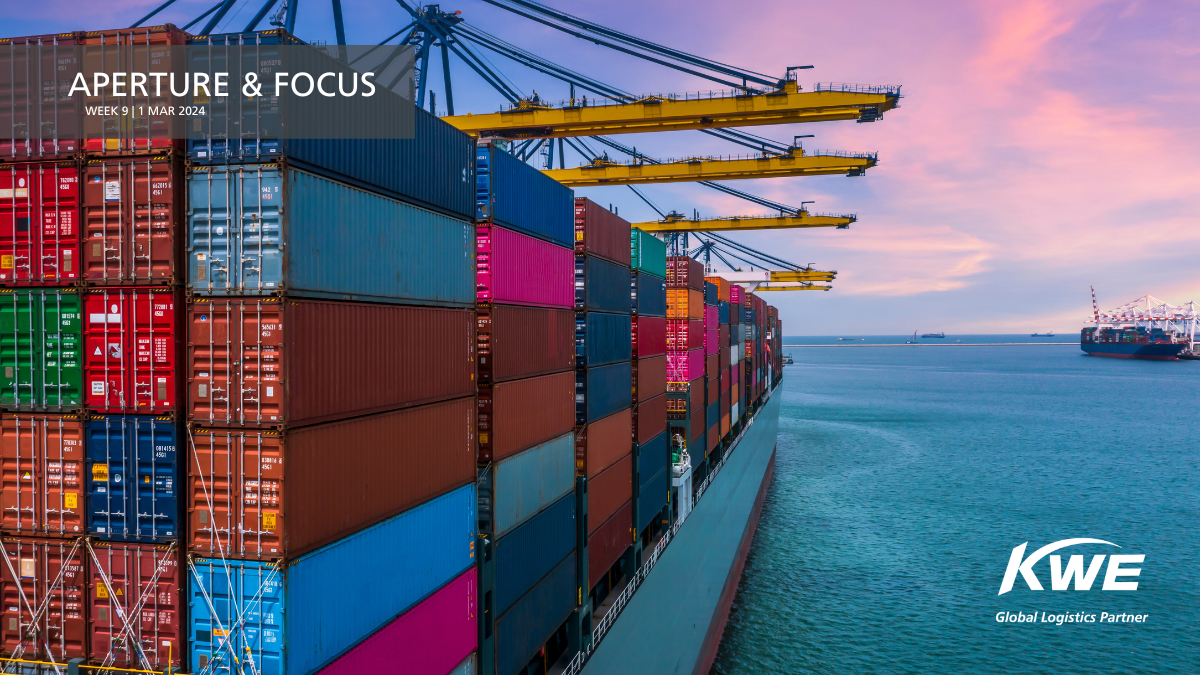Quote
Aperture & Focus 2024: Week 9

Global Aperture
In response to the logistical challenges presented by the crisis in the Red Sea, ocean carriers have reportedly ceased the sale of containers and stopped returning leased equipment to prepare for a tightening supply. As longer voyages around the Cape of Good Hope become a regular occurrence, containers may soon be in short supply despite the global surplus that arose during the pandemic.
In addition to this, a number of groups have called for government intervention amid these ongoing Red Sea shipping issues. The British Chamber of Commerce revealed new research documenting significant disruption to UK businesses with increased costs and delivery delays, calling for the establishment of an Exports Council to support the government’s export strategy. Similarly, European group EuroCommerce, which represents European and retail and wholesale sector, reported over $80 billion in cargo rerouted and significant logistical challenges, urging for increased efforts to mitigate these disruptions amidst ongoing security concerns.
Regional Focus
Americas
United States: In response to concerns about port security vulnerabilities, the President of the U.S. issued an executive order on February 27th allocating $20 billion for the development of domestic port infrastructure over the next five years. This move aims to reduce the risk of potential cyber-attacks and espionage targeting critical port operations and prompting similar considerations in other countries, including the United Kingdom.
Asia-Pacific
China: Following an accident on February 22nd involving a cargo ship that hit Lixinsha Bridge in Guangzhou causing a partial collapse that resulted in five casualties, temporary traffic control measures were implemented within a 500-meter radius where no commercial ships are allowed to pass through. Repair work is estimated to take four to five months, leading to delays for ships and trucks in the region.
India: India has extended its open sky policy for three years for foreign cargo carriers to operate from all international airports. It aims to facilitate air cargo movements, enhance air cargo capacity, and address congestion issues at major hub airports like Delhi. Meanwhile, it provides opportunities for non-metro airports to expand their cargo operations and the perishables trade by enabling farm producers and exporters to access global markets more efficiently.
Europe, Middle East & Africa
Spain: In what can largely be attributed to the diversion of Europe-bound vessels away from the Red Sea due to ongoing attacks, Spain's top ports experienced a significant increase in goods traffic in January, with volumes rising by up to 25% year-over-year. Additionally, widespread blockades by farmers led traders to favor sea routes over trucking through Europe, notably boosting traffic through northern Spanish ports like Santander and Bilbao, where volumes tripled.
Netherlands: The Port of Rotterdam has taken a step toward sustainable shipping practices by adopting the Green Award Foundation's Ship Waste module program to verify ships meeting new environmental performance criteria mandated by recent EU regulations. This initiative requires member state ports to offer waste fee discounts to ships demonstrating reduced waste volumes and sustainable management practices.
Germany: On February 28th, technical staff at Lufthansa initiated a three-day strike over wage disputes— a move which Lufthansa has called unnecessary with further negotiations set for early March. While Lufthansa has stated that passenger flights will not be impacted, KWE sources expect that this will impact cargo operations at all German locations through March 1st.